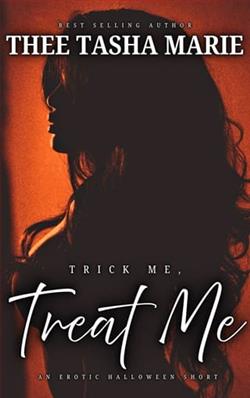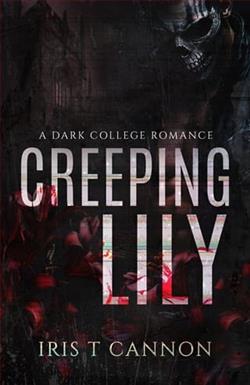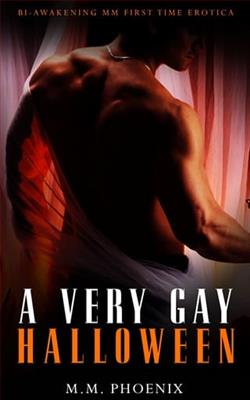Page 50 of Wings of Frost and Fury
I underestimated how weary I am. I haven’t recovered enough from trapping the dragons in the stable and casting the transformation spell on Ashvelon. I forgot to include that missing energy in my calculations when I estimated what I could handle
The spell has shifted into a momentary stasis while I decide what to do. I can proceed and perhaps finish it successfully—but I will die.
My second option is to break myself out of the spell. It will fail, and the backlash will damage my body and my energy. I’ll be sick for weeks, unable to attempt it again until mating season has already passed.
Or I can find some other source of power, some alternate channel from which to summon more strength… just enough, perhaps, for me to survive this.
My father’s books focused on the Janaan school of magic, which discourages emotion as a means of energy provenance. But I follow the Dal Vitalin way of thinking, and a subset of that method is emotional potency, which I first learned from a tiny, fat volume wedged behind others on a shelf in our home library. That book explained how to harvest positive emotions as a source of additional magical energy.
When all other sources of energy are stretched to the limit, emotional potency can lend an enchanter enough force to conclude a spell. Depending on the quality of the emotion that’sused, it also contribute a richness and beauty to the resulting magic that can’t be achieved any other way.
Despite my proclivity for laughter and sarcasm, I don’t feel genuinely positive emotions very often. My mother left us when I was ten. Katlee died in my spell circle. My father drove me from his house. And everyone since then has only wanted to use me. If they can’t use me, they exile me, sometimes openly, sometimes subtly, but it’s effective either way.
So yes, I feel the surface joy of clever joke, the comfort of a good meal, the pleasant haze of wine. But under that shallow layer of merriment or warmth, my deeper emotions are creatures of shadow with broken wings, fluttering in the dark thickets of my soul.
I’m too self-aware to think that I could ever rely on emotional potency, so I always plan my spells without it. Usually, I have plenty of my own energy, and I employ various ingredients and crystals to supplement it as needed. I know there is not enough positive emotion inside me to drawn upon. It’s no use looking to my heart as an alternative source of power.
But this time when I search the thorny thickets of my heart, among the torn wings and icy shadows, there is something new. A warm, golden energy, unfurling from the darkness. This is no fragile flower—it has a sturdy golden root, running deep into my soul and branching outward, linked to another soul outside my body.
To use it, I have to name it, and I have to confess its source. It goes against every sardonic bone in my body, every caustic and careless impulse I’ve learned as a defense against softer feelings.
But I have no choice. I must name it, or die.
The emotion is love, and its source is my dragon.
I seize the love between us like the lifeline it is, and I surface back into the spell.
It’s strange coming out of that time-suspension, that blind trance. I can see the cave again, the spell, the circle—and my fingers, paralyzed in the act of setting the eclipse gem on Ashvelon’s scale. I place the gem and resume the spell, drawing from that rich gold inside me, from that connection we share.
Love fuels the transformation spell in the moments of its conclusion. Love fills the spaces where I don’t have enough energy left.
The last phrase leaves my lips: “to begin at sunset.”
And it’s done. The eclipse gem dissolves and dissipates, the light of my energy dies, and the candles wink out.
I have just enough vitality left for a flicker of existence.
My body topples sideways, utterly limp. I can’t move a muscle. All I can do is breathe shallowly and stare out of my mortal shell through half-closed eyes.
I’ve read about the enervation state, in which a sorcerer goes completely immobile while they recharge their energy, but I’ve never entered one myself. Thankfully, it isn’t permanent. After six or seven hours, I should be able to move and speak again, though I’ll still be exhausted and weak.
The stone floor vibrates beneath my body. Ponderous footfalls—the steps of a dragon.
Ashvelon’s muzzle brushes against my hair. “Thelise.”
I told him to wait by the entrance, even if I screamed. He must have thought everything was too quiet and looked back to check on me.
“Thelise,” he says, more urgently.
I can’t blink or give him any kind of sign. I can only stare.
His voice deepens with agony. “No… not you, too.” He groans heavily, wretchedly. “No, I can’t, I can’t fucking bear it.”
Shit, he thinks I’m dead. If I’d known I would go into the enervation state, I could have warned him about it. But I didn’t anticipate this.
I manage to move my eyes a bit, trying to signal to him that I’m alive, but he’s not looking at my face. He’s pressing his nose against my body, sniffing.
“You do not smell like death.” He sounds slightly reassured. “Perhaps you are injured from the magic.”















